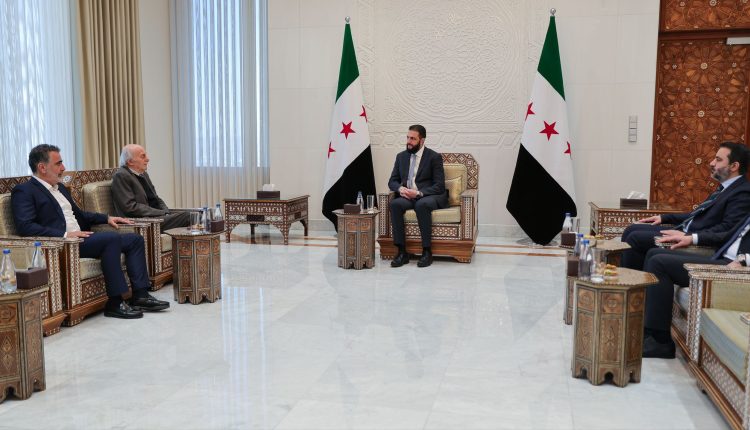Lebanese Leader Jumblatt Calls for Arab and International Support for Syria Amid Regional Tensions
By Kardo Roj
DAMASCUS, Syria (North Press) –
Former Lebanese politician Walid Jumblatt called on Arab nations and the international community to stand by Syria during its political transition, following a high-profile meeting with transitional President Ahmad al-Sharaa in Damascus on Saturday.
The meeting, held at the Presidential Palace in the Syrian capital, comes at a critical moment for the country as it grapples with escalating violence in Druze-majority areas and rising regional tensions, particularly in light of recent Israeli airstrikes targeting government and military sites.
“I urge Arab states and the global community to support Syria in building its new state,” Jumblatt said in a press statement following his talks with President al-Sharaa and Foreign Minister Asaad Hassan al-Shibani.
Jumblatt emphasized that Syria’s sovereignty must be respected and highlighted that Israel’s recent air campaign complicates political efforts aimed at stabilizing the country.
“The violations of Syrian sovereignty by Israel do not contribute to the political resolution we are working toward with President al-Sharaa,” he stated, referring to Israeli airstrikes near the presidential compound and other locations in recent days.
While refraining from inflammatory rhetoric, Jumblatt’s comments reflect growing regional concern over Israel’s assertive military posture in southern Syria, particularly in areas with strong Druze presence such as Suwayda and Sahnaya.
Tensions have surged over the past week following clashes in Druze-populated areas including Jaramana and Ashrafiyat Sahnaya. Initial reports from official media labeled the unrest as acts by “unlawful groups,” while local observers pointed to grievances related to governance, security, and sectarian friction.
The unrest soon triggered a security response from Syrian authorities, which resulted in civilian casualties and led to further escalation, including Israeli airstrikes purportedly aimed at deterring action against the Druze community.
One Israeli strike on May 2 targeted a site near the Syrian presidential palace in Damascus, prompting a sharp response from the Syrian government and condemnation from the Arab League and several Gulf nations.
Jumblatt’s visit marks a notable moment in regional diplomacy, coming just days after U.S. and Arab officials condemned sectarian incitement and called for protections for all Syrian civilians, particularly minorities.
His outreach to the transitional government signals a willingness among some Lebanese and Arab political actors to re-engage with Damascus amid an evolving geopolitical landscape. This shift is partly driven by concerns over the destabilizing potential of continued violence, as well as by recognition of the role that new Syrian institutions could play in long-term regional stability.
Jumblatt’s Druze identity and long-standing influence in Lebanese politics lend symbolic weight to his statements. His support for dialogue with the Syrian leadership may also help ease concerns among Druze communities on both sides of the border, many of whom are alarmed by the recent wave of violence.
As Syria’s transitional leadership seeks to consolidate state institutions and restore public confidence, international engagement remains a crucial component of the process. The Autonomous Administration of North and East Syria (AANES), while not directly involved in the current crisis, continues to monitor the situation closely, as instability in the south could have broader repercussions.
The Syrian Democratic Forces (SDF), which maintain security in vast portions of the northeast, have not issued a public statement on the recent developments. However, their focus on preserving regional stability and countering extremist threats positions them as a key stakeholder in Syria’s evolving security landscape.
With diplomatic overtures increasing and regional actors signaling interest in a political resolution, observers stress the need for a unified approach that safeguards all components of Syrian society—including its religious and ethnic minorities.
Whether the renewed regional engagement and Jumblatt’s appeal can help de-escalate tensions and reinforce Syria’s political path forward remains to be seen. But his visit underscores the growing acknowledgment that Syria’s stability is integral to the region’s future.

